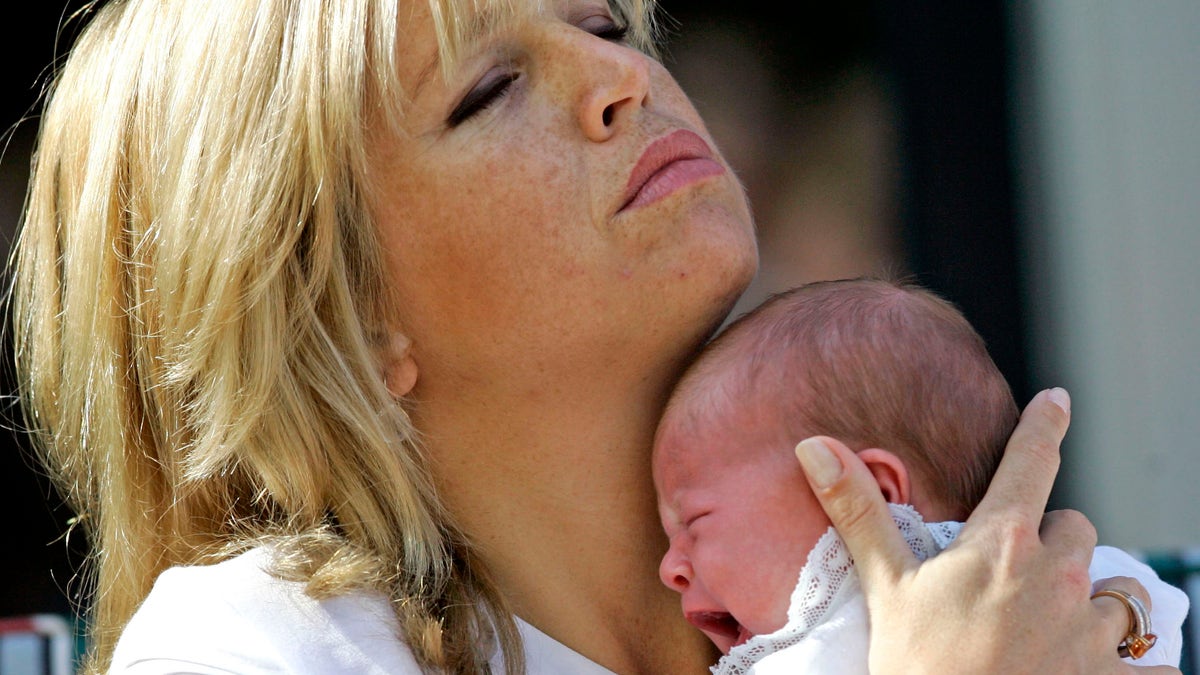
(Photo by Michel Porro/Getty Images) (2005 Getty Images)
It’s not only the parents suffering a headache from babies with colic.
While the distressing nonstop crying of babies is often blamed on tummy trouble, a new French study suggests the problem could be linked to migraine headaches in at least some infants.
The findings, published Wednesday on the Journal of the American Medical Association, showed children and teens treated for migraine headaches were much more likely than other kids to have had colic as infants.
Researchers hope that correlation between the two, which was suggested once before by another study, will help pave the way for new colic treatments.
"Infantile colic causes pain in babies and high levels of stress in parents. Preventive therapies for migraine could therefore be an option in the future," said study co-author Dr. Luigi Titomanlio, chief of a pediatric migraine clinic at Robert Debre Hospital in Paris.
But Titomanlio said more research is needed to prove any link between colic and migraines, and studies would need to be done before recommending the use of migraine treatments for babies' colic.
Observing three hospitals in Italy and France, of the around 200 children and teens who got emergency treatment for migraines in the study, 73 percent had colic as infants, versus 27 percent of children in a control group. That group — 471 kids — got emergency treatment for minor trauma and had no history of recurrent headaches.
An editorial in JAMA calls it important research and says if colic really is an early form of migraines that might explain why digestive treatments typically don't help colic.
Definitive causes are uncertain for both colic and migraines.
Roughly 20 percent of U.S. infants have colic — intense crying spells lasting more than three hours a day, at least three days a week, for more than three weeks in an otherwise healthy baby. It usually starts a few weeks after birth. The symptoms are sometimes blamed on digestive problems including gas but experts say the true cause is unknown.
Migraine headaches are rare in very young children but by middle-school and teen years as many as 10 percent or more experience them.
The throbbing headaches are thought to be inherited and may be caused by some sort of irritation in nerve cells in the brain interacting with brain blood vessels.
The researchers said it could be that colic is caused by similar changes in nerves and blood vessels in the gut.
The study supports the idea that colic "may be an early life manifestation of migraine," said Dr. Amy Gelfand, a neurologist at the University of California, San Francisco's Headache Center. Her own research, published last year, found that infants whose mothers had migraines were more than twice as likely as other babies to have colic.
She noted that Tylenol is sometimes used to treat migraines in children, and pain in infants, but said whether it works for colic should be studied.
Janelle Valore of Mount Joy, Pa., said she was intrigued by the results. Her mother, sister and cousins all have migraines and were colicky as babies. Valore was spared both, but her 5-month-old daughter, Alena, just got over a nearly three-month bout with colic, and now she wonders if the baby will develop migraines later on.
"I always thought it was gas," but treatments designed to relieve gas and tummy upsets didn't work for her baby, Valore said.
She said her daughter would cry day and night "and I'd cry right along with her."
Based on reporting by The Associated Press.
Follow us on twitter.com/foxnewslatino
Like us at facebook.com/foxnewslatino
